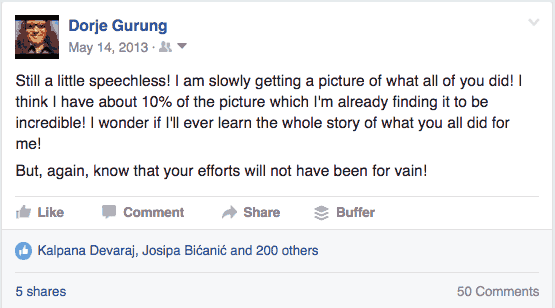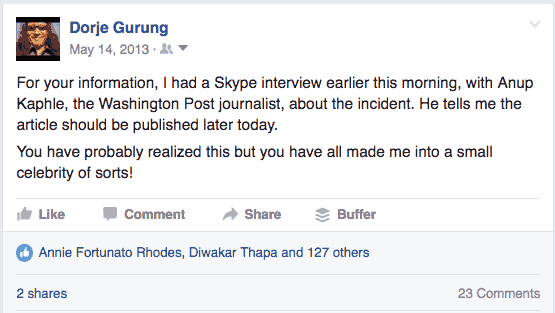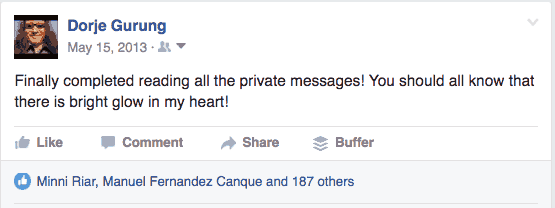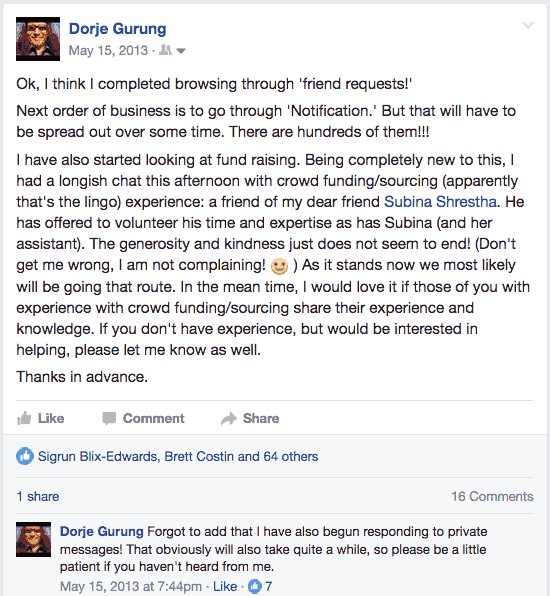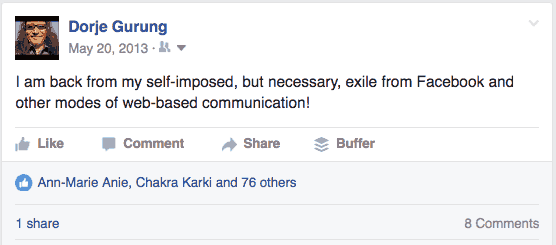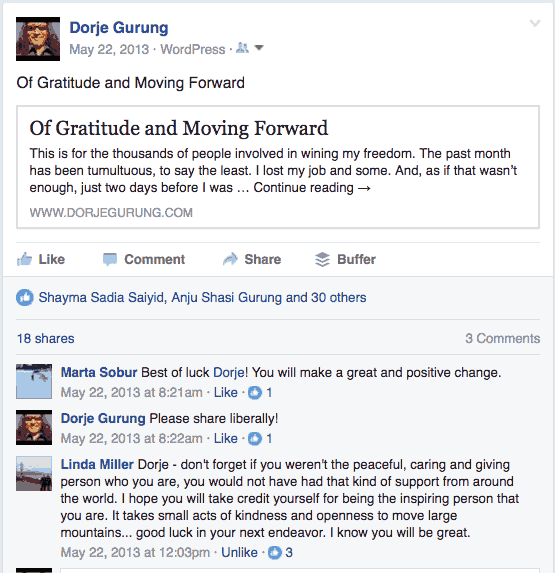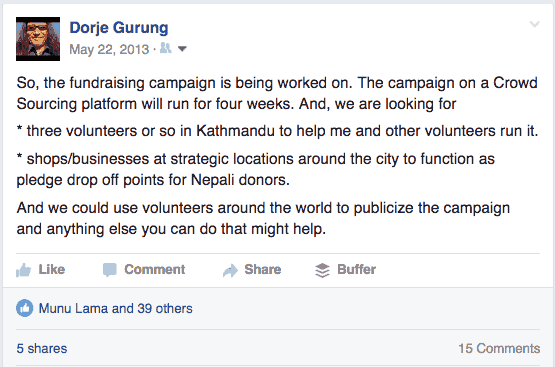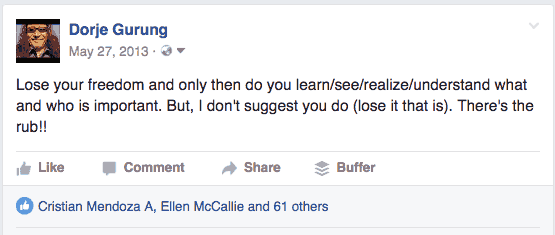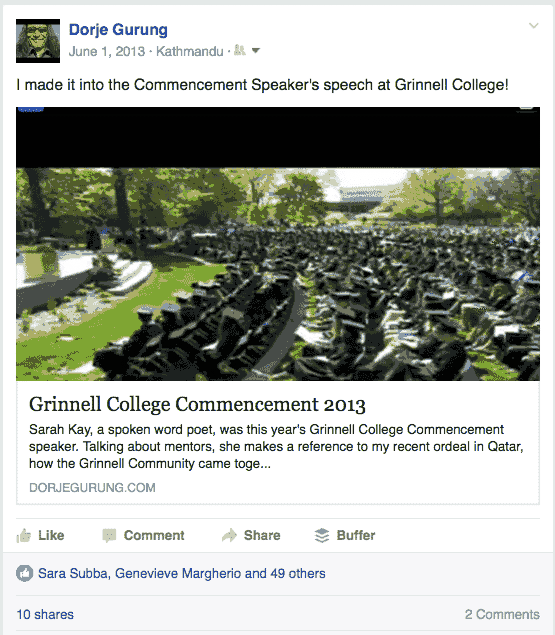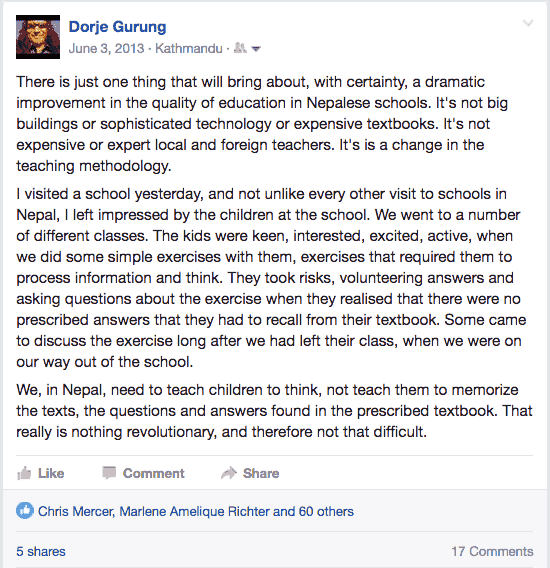That I am NOT celebrity material is something I have always known, and still believe: I don’t have the personality for it.
As a matter of fact, most who know me as an adult know how quiet, private, and publicity-shy a person I am. Plus, I have very limited skills in — and tendency for — self-promotion. I am pretty useless at selling myself. I am so bad with it all that, I even struggle to take — and react appropriately to — praise, my international friends have pointed out.
Naturally, I have often shunned publicity and avoided drawing attention to myself. Whenever, as an adult, the spotlight has been on me or I have attracted attention, however briefly and for whatever reason, more often than not I have felt uncomfortable and even embarrassed.
The level of interest in, and engagements with, my Facebook posts following my return to Nepal from Qatar was one of those recent instances.
My first post-Qatar Facebook post, a thank-you note, over 150 people “Liked” it, over 140 shared it, and over 80 commented on it. (The post was also reproduced elsewhere, including on the Free Dorje Gurung Facebook Page, where 1K users “Liked” it, over 460 shared it, and over 200 commented on it.) Not a single one of my posts until that point had EVER received anywhere near as much engagements!
What I have reproduced below are images of many of my Facebook posts from the first month-and-a-half of being back in Kathmandu, including the details of the level of engagements. Most of them just describe what I was doing.
The following post, made the day after my arrival in Kathmandu, describes what I was doing and discovering. Again, notice the level of engagement!
In the second post that day, I shared how they had “made me into a small celebrity.” However, I doubt anyone caught on to the fact that, that actually was discomforting because I didn’t give any hint of it.
Unaware that I was actually uncomfortable and embarrassed, an older Xaverian Facebook friend commented thus:
The next day, I shared two status updates about having gone through all the PMs and friend requests!
Then, on May 16, just days back in Kathmandu, a little overwhelmed by everything, I posted a status update saying that I was taking a break.
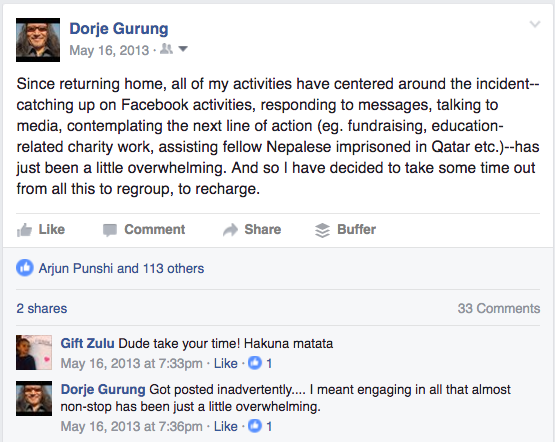
Of course, being uncomfortable with all the attention I was getting — both on social media and real-life — was just a minor issue.
I was suffering from and trying to contend with much bigger problems.
However, I didn’t make even an oblique reference to any of them at any time in any conversation with anyone, forget about sharing the details on social media. I did say I am a very private person, didn’t I?
One of the days I took time off from social media, I visited a psychiatrist friend of mine, a classmate. My conversation with him however, centered around all the reasons behind my decision to return to Nepal and how I was questioning it. Leading up to the decision to return, long before my brush with the Qatari law, I had, in February, turned down a job offer paying thousands of dollars per month in salary. I didn’t share any details of the major emotional and psychological issues I was internally wrestling with.
(Towards the end of our conversation, he asked if I wanted any prescriptions. He added that he would be happy to prescribe some drugs. I appreciated his offer but I replied, “No.” That would mark the first and the last time I had a real serious conversation with him.)
After staying away from social media for four days, I returned on the 20th.
Something else I didn’t share on social media was my decision over the weekend to NOT grant any interviews to Nepali journalists.
Again, just as with the attention on Facebook, their attention also made me uncomfortable, among other things. With them, there was also the added issues of them misrepresenting and/or exaggerating what I said and my life story etc.
(If interested in what I mean, you can start with the article in Kantipur written by Hom Karki based on the exchanges we had when he had accompanied me in Doha on May 13. The others appeared in My Republica, Setopati, and another one again in Kantipur. If you want to read an example of egregious mistakes by a journalist, read this.)
Not content with just a Facebook thank-you post, I published a blog post of gratitude. Sharing it on Facebook resulted in it being shared 18 times! Not surprisingly, the blog post itself also received loads of traffic!
Social issue posts I had made until the Qatar incident, no different from this one made just two weeks before my incarceration, hardly used to get ANY engagements. But now, just a post about Monsanto received an unusually high number of engagements!
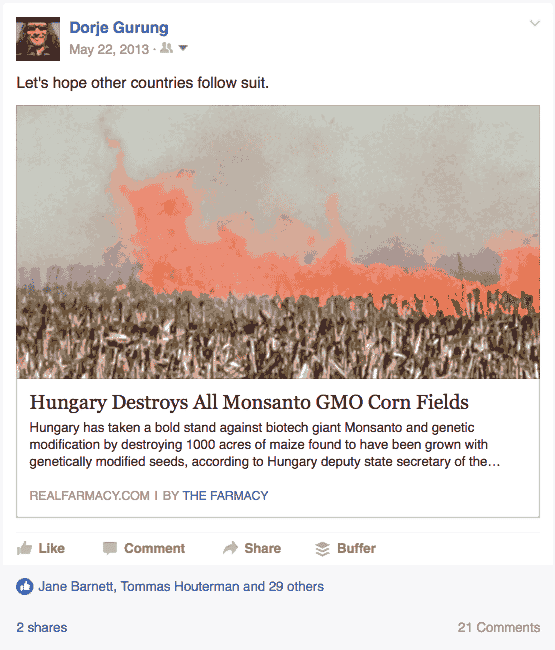
Not long after arriving in Kathmandu, I had also started working on a fundraising drive, with a lot — LOT — of help from Sakar, a friend of a friend.
After the fundraising campaign went live on May 25, I posted regular status updates for the next 35 days about how it was doing many of which, again, got regular reactions from friends.
A share of an article by someone else, again, got a good deal of engagement.
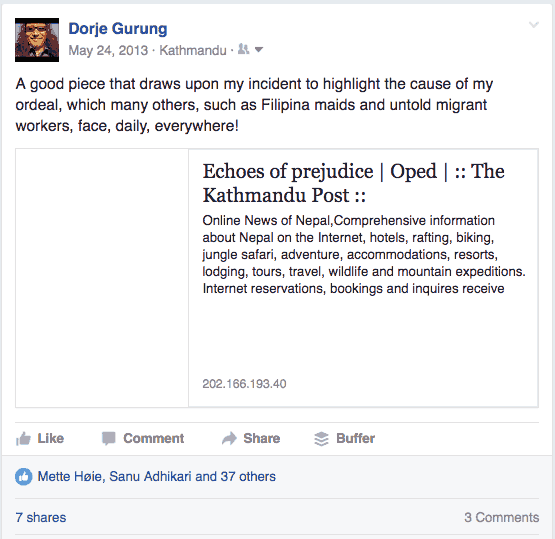
On may 27, I posted something reflective.
On May 31, a link to my “About Me” page. It was shared 13 times!!
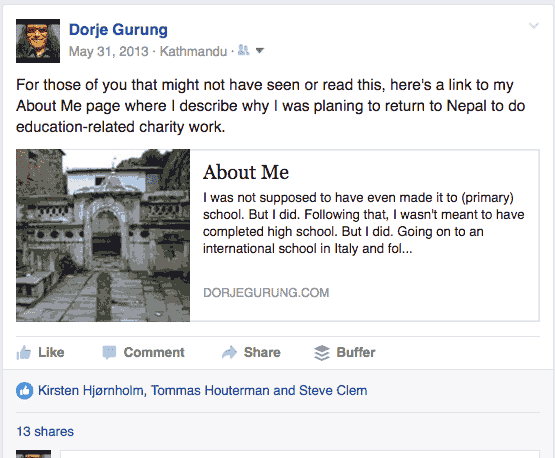
On June 1, I discovered that I had made it into the Grinnell College commencement speech given by the spoken poet Sarah Kay (who I would meet in person at a later date).
On June 3, following a visit to a small private school in the city, I shared how just a slight change in teaching method could improve student learning outcomes in Nepal, which again received a lot of reactions.
Here are some more from June, and notice again the level of engagements.
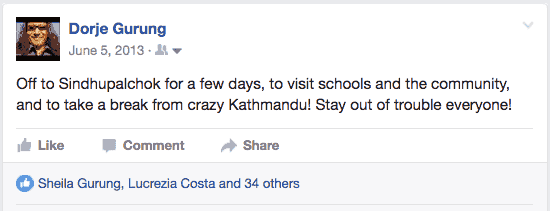
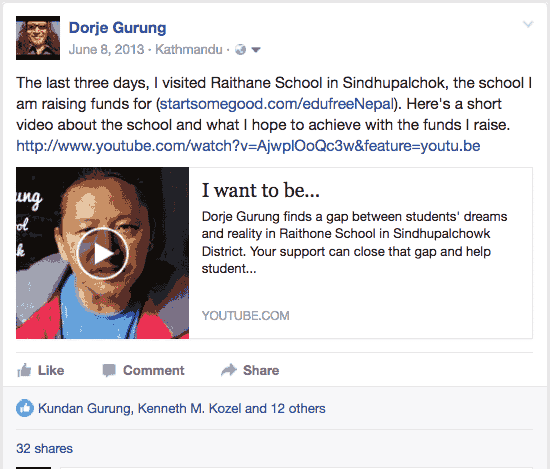
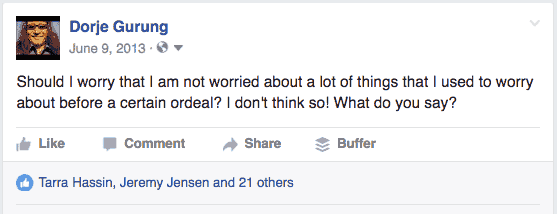
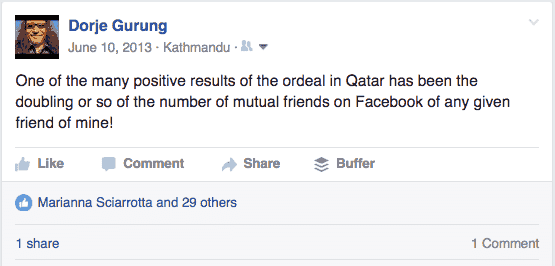
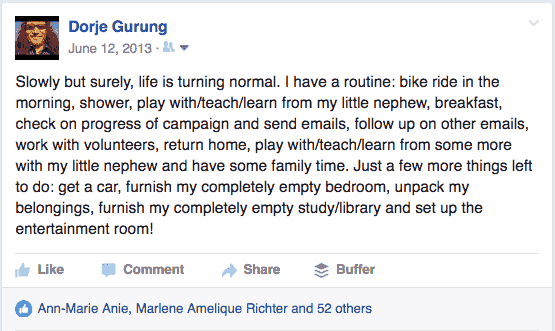
Truth be told, of course I was a little flattered with all the attention I got.
However, for a while, I rarely if ever reacted, responded to, or engaged with, the comments. I didn’t respond to the dozens of comments under the thank-you post on my timeline, nor did I respond to those under the Free Dorje Gurung page. I didn’t engage with friends who engaged with most of the other status updates either. It took about a month to feel okay about responding and reacting to the comments etc.
I did recognize that the attention might help with shining the necessary spotlight on the issues I planned to work on, things I would be doing to further them, and possibly, in some way, contribute to addressing them.
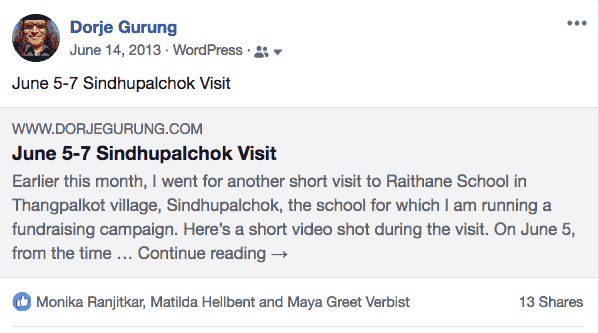
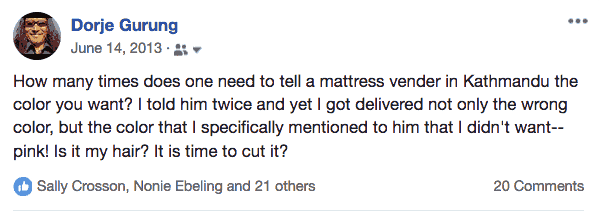
And on June 17, I posted a satire!
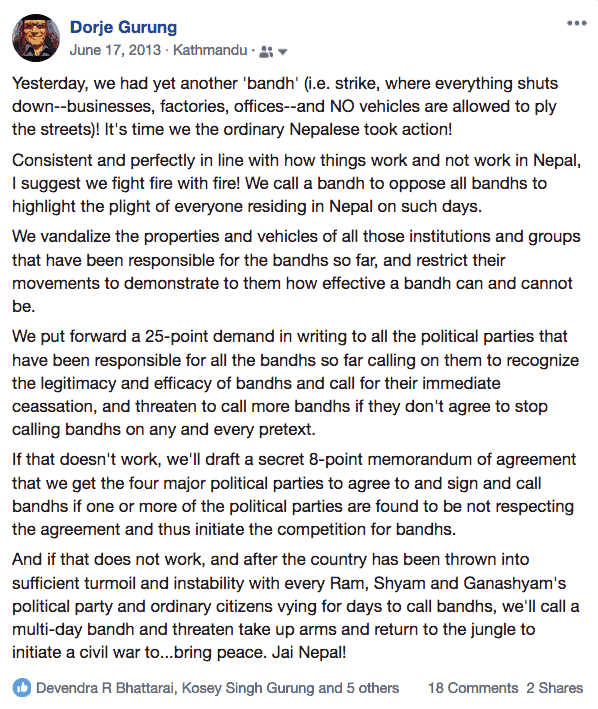
But of course, as I have already alluded to, all the while, I was suffering…greatly.
The memories of the young jail mate, Chotu, for example, was always painful and often brought me to tears. On June 20, I gave into the temptation to share a post referring to him but left out the tears.
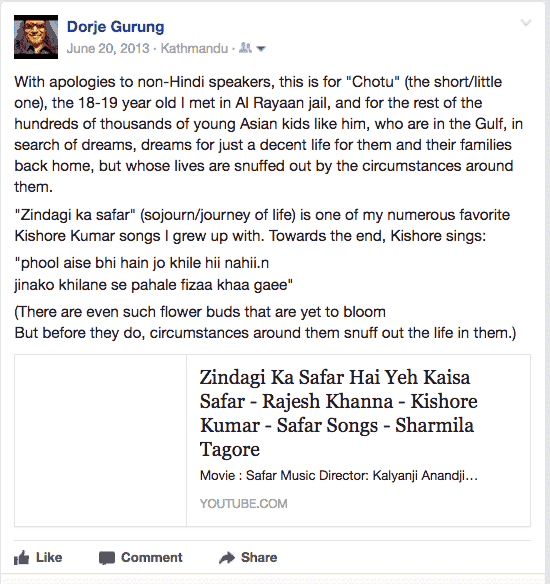
Two days later, I shared a silly status update!

I followed that up with a serious post.

In a June 30 post, I poked fun at my “minor celebrity status.”
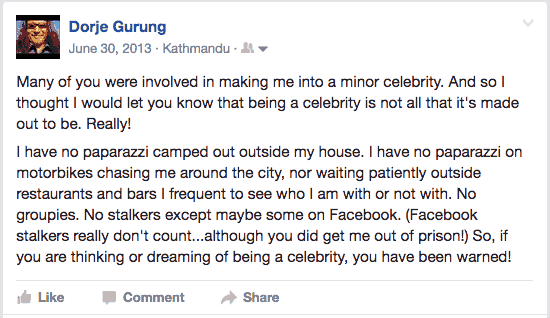
And finally, one of the last status updates for the month of June:
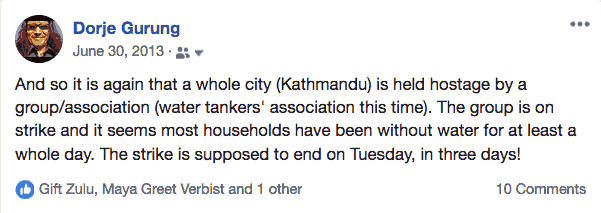
Strangely enough, even a classmate from my secondary school years at St. Xavier’s Jawalakhel School — the one who called me an idiot in a private exchange — in a PM, as late as October 2013, believed that I thought of myself as a “celebrity.”

While there may have been real-life friends like him who thought I was basking in my new-found “fame” — in my minor celebrity status — to me it was of little concern. Let me put it this way: it was no balm to me.
As a matter of fact, every time anyone, in person, would refer to my being “famous” I would correct them saying, “You mean infamous?!” or “You mean notorious?!”
Far from relishing the status and the attention, when people in Kathmandu recognized me for the “teacher jailed in Qatar” it did not sit well with me. As a matter of fact, moonlighting as an assistant to my mate Pete Patisson, a journalist for The Guardian, when we would be out and about, visiting offices, looking for people, talking to people and interviewing them etc., I would often introduce myself only as “Dorje” to avoid being recognized.
What people were probably unaware of was that I was contending with much more serious issues to allow the “celebrity” thing to get to my head.
I was suffering — personally, socially, emotionally, and psychologically — from the consequences of being unjustly jailed. I was in pain, struggling with a heightened sensitivity to the suffering of others which brought me to tears regularly, as was also alluded to earlier. I had to contend with the rage and the fire still burning inside of me. I had to contend with the fallout from the experiences of the depths of despair and trauma, among other things.
However, forget sharing anything about that on social media, I didn’t share any of that with even a single person in Nepal.
One of the reasons was that, I didn’t feel close enough to, and comfortable with, anyone in the country to open up to and confide in. (Every single one of my very close Nepali friends live abroad.) Not a single person living in Nepal, who I knew, had I really talked to about real issues I had faced in my life anyway. Forget about the kind of serious issues I was contending with.
The one time I had attempted to share something serious about the incarceration incident, though not the details of my struggles, at a gathering of over a dozen and a half St. Xavier’s classmates in early July 2013, less than two months after arriving in the country, I got shouted down. I decided I wouldn’t attempt anything like that again with friends in Nepal and haven’t.
Another reason had been that no one had asked.
Not a single person in Nepal inquired about the deeply troubling aspects of my experiences in jail. Not a single person during the first month and a half, or since, has reached out expressing an interest in learning about them or out of concern for me. Forget about contacting me with offers of emotional and/or social support to help me cope. (International friends, on the other hand, did.)
But that was to be expected; it’s not entirely their fault!
The fault partly lies with our culture, a culture of associating stigma with such issues — issues of emotional and psychological nature. Most Nepalis do their best to avoid talking about or discussing them. Even those who may have been aware that I was suffering, probably allowed their discomfort of — and/or their feeling of a lack of sensitivity to — broaching the subject triumph over reaching out. After all, pretty much every single Nepali in the country who has known me most of their life is a product of Nepali culture and people.
The fault also lies with my relationship with them. Most of then, incidentally, are men. We are just not used to having serious conversations about our emotions and/or traumatic experiences (such as those at least some of us must have experienced in our childhood at home and/or at school). (I don’t have any real close female Nepali friends owing to the fact that I attended an all-boys St. Xavier’s school and left the country soon after ten years of schooling there!)
I did hear of, for example, Nepali friends who, though not very close to me, had been very personally deeply affected by my incarceration (which I was very deeply touched by). However, again, most of that I heard from others, not directly from the individuals themselves. (With my closest Nepali friends however, we did talk at length about how they felt and what they did etc.)
I think the fault may also lie with lack of knowledge and understanding. How many Nepalis or what Nepali would be aware that such an experience is traumatic to begin with? Assuming there are some who do, and even among the Nepalis I know, how many actually believe that they should reach out AND believe that they know how to do so appropriately? I could be mistaken but probably few to none. Who knows though!
The end result of all that, anyway, was my following my own timeline and deciding, alone, everything I did or didn’t do to cope.
I talked about that in the blog post It’s Not You, It’s Me published a little over a year-and-a-half after arriving in the country. (In it, incidentally, addressing an issue anonymously raised by a former colleague about my portrayal of a Qatar Academy administrator in blog posts about the Qatar incident, I make oblique references to the issues I was suffering from.)
I also realized pretty early on that writing could help me cope with it all, that writing could help me “move on” with my life. So I made notes, copious amount of notes to that end, and started writing and publishing details as well as giving talks about my experiences. Of course, writing was — and continues to be — cathartic!
But, I would take my time to make public some of the bitter, painful, and very uncomfortable truths about my experience.
My experience of the depth of despair in jail, I would publicly admit only after a year-and-a-half, in a presentation at the Li Po Chun United World College (LPCUWC). A year after that presentation, in other words, two-and-a-half years after arriving in Nepal, I would finally share, in the blog post Qatar…From Afar: Long Flight to Freedom, the details of what had driven me — professionally and personally while teaching at Qatar Academy — to the bottom as well as the source of the despair.
As for the details of my wrestles with my heightened sensitivity to others’ pain and suffering, which would cause me to tear-up and cry regularly, I would reveal only four years after arriving in the country (in the blog post Qatar…From Afar: Freedom Cries). Some of the details of the rage I have been wrestling with, only in the last few months have I been able to share on social media, and, very recently, in a blog post — after more than five years since arriving in the country and four years since I first made a reference to it in another blog post.
There’s more to all that, of course, and, by the looks of it, I’ll have to weather and overcome them all on my own, mostly.
It’s partly to that end that I decided to change how I use Facebook and Twitter. (If interested in learning about another reason, read My Facebook Posts According to a Friend: “Criticism of Nepal and Nepalis” And “Often” “Highlight the Privileged”.) It’s also partly to that end that I quit my job.
Far from thinking of myself as a celebrity, I have actively given up on the little or minor celebrity status I ostensibly had in order to reclaim my quiet and private life and, more importantly, to heal.
What do you think?

